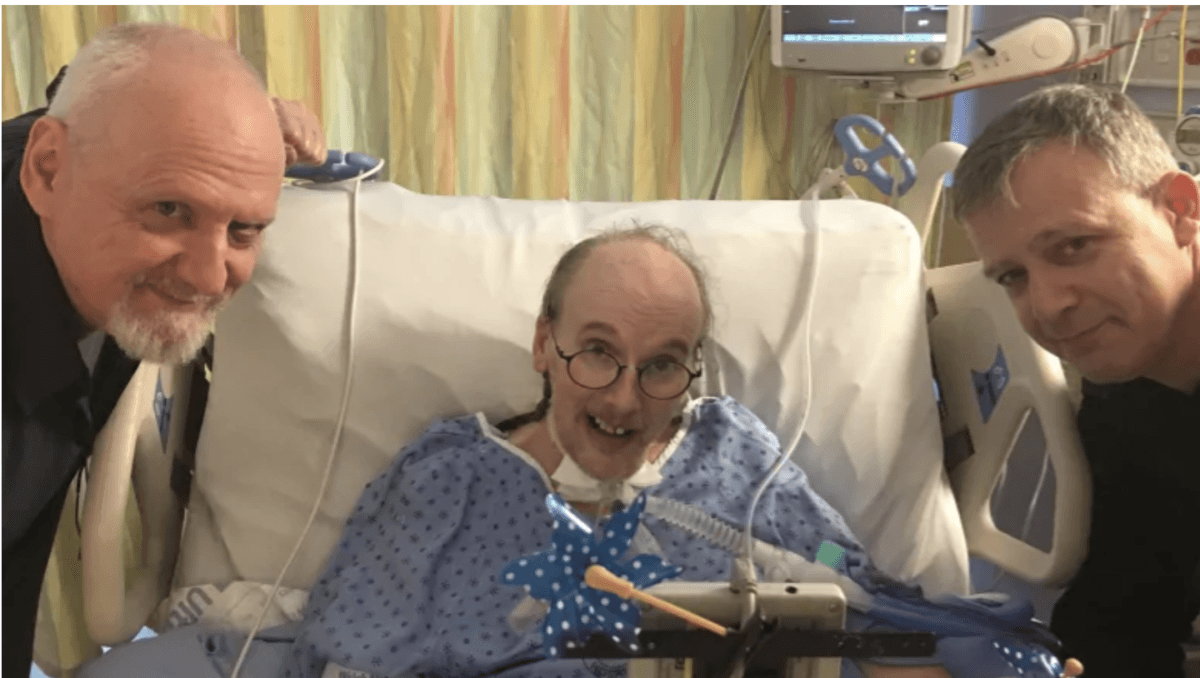
How one man is speaking up for ALS patients, even without his voice
Published in CBC Radio October 25, 2019, written by Jeff Goodes
Friend Gregory Gardner, Jay DesMazes and his brother Michael DesMazes. Jay says that, as an ALS patient, having family and friends to speak up for him is crucial. (Brian Goldman/CBC)
People living with ALS are ‘very frustrated’ with elements of health-care system, advocate says
Jay DesMazes is “100 per cent dependent” on his tablet to communicate.
Bedridden with extremely limited movement, the 56-year-old is living with the latter stages of amyotrophic lateral sclerosis (ALS), a genetic disease. A ventilator pumps air into his lungs via a tracheostomy.
He lost the ability to speak over a year ago. Now, as DesMazes lies in a hospital bed, his eyes dart around at an iPad. A camera perched atop the tablet picks up the eye movement, matching it to a letter on the screen.
DesMazes assembles words one letter at a time. A synthesizer reads the sentences he writes.
“Without it, I would be insane,” DesMazes said of the tablet.
How ALS patient Jay DesMazes communicates 1:59So much so that he describes three days without the device in a Surrey, B.C., hospital as equivalent to “having your mouth taped shut.”
“That is what it’s like when you can’t communicate at all.”
No tablet for 3 days
White Coat, Black Art’s Dr. Brian Goldman recently visited DesMazes in the High Acuity Unit of the Abbotsford Regional Hospital, where he has been for the past two months. He provided DesMazes with a list of questions ahead of his visit. DesMazes spent hours typing out his answers, describing his life with ALS and alleging mistreatment during his care at Surrey Memorial Hospital.
Earlier this year, DesMazes was taken to the hospital in respiratory distress. He says he had just been transferred to the hospital and claims staff didn’t read the instructions that accompanied him.
Jay DesMazes at the Abbotsford Airshow, August 2008. He was still years away from his diagnosis of ALS. (Submitted by Michael DesMazes)
“I have a specific set of instructions that moves with me everywhere I go. The nurse didn’t take the time to read instructions,” DesMazes said. “She couldn’t get me lined up properly to use the computer. She assumed the computer was broken and she took it away from me.”
DesMazes is completely dependent on his care providers for everything from keeping his airway clear, feeding and toileting him, moving him so he doesn’t get bedsores, and positioning his head so he can use his speech device.
According to DesMazes’s account, he was without the tablet for three days, until his brother and advocate, Michael DesMazes visited.
“If you’re in a hospital and that equipment isn’t set up, you can’t communicate. As one client said, ‘If I’m sitting beside you, I could be choking to death and you wouldn’t know it.'”
– Tammy Moore, CEO of ALS Society of Canada
“This meant I couldn’t tell them when I had a bowel movement or when I was uncomfortable.”
Michael DesMazes says there have been repeated problems with staff not “taking the time to listen to his needs, or to listen to his aches and pains.”
Tammy Moore, CEO of ALS Society of Canada, says there are about 3,000 people living with ALS in Canada. She’s heard similar accounts from other ALS patients about a communication device being inaccessible, and the consequences can be severe.
“If you’re in a hospital and that equipment isn’t set up, you can’t communicate. As one client said, ‘If I’m sitting beside you, I could be choking to death and you wouldn’t know it.'”
The brothers say they complained about the care at Surrey Memorial Hospital. However, a spokesperson with Fraser Health Authority, which oversees the hospital, said it did not receive a complaint to its Patient Care Quality Office, but encouraged the family to follow up on their concerns.
“We always strive to provide quality, timely care to all of our patients…and encourage them to speak directly with their care teams in order to address their concerns in the moment,” the statement continued.
Jay DesMazes last food by mouth was most likely sushi, says his brother Michael who would bring it to him at least once a week and feed him. (Submitted by Michael DesMazes)
‘Appropriate’ home care, palliative support needed
Moore says people living with ALS are “very frustrated with access to many elements of the health-care system.”
“If Canadians understood what the personal experience is of people with ALS, they would be horrified.”
“At some point, every person with ALS will have an issue with the health-care system. It would be surprising if they didn’t.”
Jay DesMazes recalls his stay at an Abbotsford, B.C., care home, in which he says he was “forced to hold urine and bowel movements for hours on end. I’ve been ignored for hours on end, like, I’ve screamed and cried for 10 to 12 hours at a time.”
He says more care aides are needed.
“They’re grotesquely overworked at all levels. There needs to be more education. There’s not enough people with this disease to make the governments sit up and listen, sadly.”
Moore says more attention needs to be paid to these vulnerable patients. ALS Canada, and its partner societies, have just finished creating detailed clinical guidelines for treating people with ALS that will be published next year.
“Oftentimes, the support workers are completely untrained in ALS. We need to have appropriate home care and palliative support. This is critical for people who have ALS,” she said.
Join our fight to #EndALS!
Sign up as to receive periodic email updates and join our circle of supporters!

